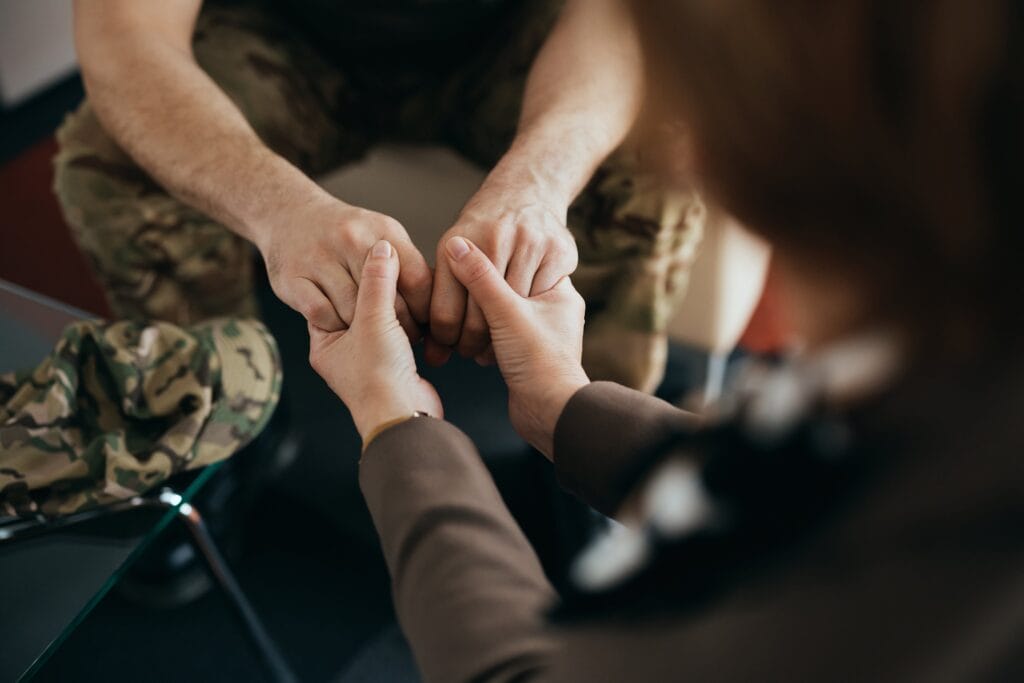Supporting a veteran struggling with addiction can be an important and potentially life-changing thing to take on. Veterans face unique challenges and often return from service with traumas that make the transition to civilian life difficult. The challenges can lead to the use of drugs or alcohol as a coping mechanism, creating an addiction cycle requiring specialized support and understanding.
Understanding Addiction Among Veterans
A significant and multifaceted issue, addiction among veterans is deeply related to the unique experiences and challenges faced by those people who have served in the military. Understanding why addiction is especially prevalent among the veteran population requires looking at the different physical, mental, and social factors contributing to substance use.
Reasons addiction is common among veterans include:
- Many veterans have gone through traumatic events during service, including injuries, combat and losing people they served alongside. The traumatic experiences can lead to the development of mental health conditions like post-traumatic stress disorder. Veterans with PTSD are at a more substantial risk of using substances to alleviate symptoms and self-medicate.
- Physical injuries and chronic pain can be an issue for veterans. Veterans may be prescribed opioids for injuries, sometimes leading to dependency and addiction. As someone struggles with chronic pain, the desire for relief can lead to substance misuse or seeking out other substances to help.
- Going from military to civilian life can be difficult for many veterans as they lose the structure, a sense of purpose and camaraderie they had in the military. Emotional challenges such as depression, isolation, and anxiety can arise. That can raise the risk of using substances to cope with this transition.
- Despite the overall growing awareness of mental health issues, there’s still a stigma associated with getting help for mental or substance use problems, particularly among the veteran community. Veterans may feel ashamed to admit they need help, preventing them from getting treatment and support.
- It’s common for veterans to experience co-occurring disorders along with substance use issues. These can complicate their recovery process and require an integrated treatment approach.
Overall, addiction among veterans is a complicated problem rooted in a combination of traumatic experiences, mental struggles, physical injuries, and social challenges.
Signs of Addiction in Veterans
One way that you can help a veteran who could be struggling with substance abuse is by learning to recognize the signs. Addiction can manifest in different ways, and by understanding the signs, you can help a loved one identify when a veteran could be struggling.
Some of the signs of addiction that a veteran may display include:
- Behavioral changes include increased secrecy, neglecting responsibilities, isolation, and loss of interest.
- Neglecting responsibilities and a noticeable loss of interest in activities or hobbies that were once appealing and enjoyable.
- Engaging in risky behaviors.
- Physical changes like shifts in appearance, health issues or sleep problems.
- Psychological signs such as mood swings, increased signs of anxiety or depression, or experiencing cognitive disturbances like paranoia or hallucinations.
- Substance-related signs include increased tolerance, withdrawal symptoms, cravings, or loss of control.
- Social issues like increased conflicts with loved ones.
- Work, school, or financial problems.
Recognizing these signs and encouraging veterans to get help can be vital to their recovery. It’s also important to provide a supportive, judgment-free environment. These are things that can make a significant difference in the life of a veteran struggling with addiction.
Ways to Support a Veteran Struggling with Addiction
Along with recognizing the signs above, other ways you can support a veteran struggling with addiction include:
Educate Yourself
As well as learning about the signs of addiction, learn about addiction itself, including its causes. When you understand the nature of addiction, you’re better equipped to approach the situation with empathy. You can also familiarize yourself with the unique challenges faced by veterans.
Be Emotionally Supportive
Create a safe space for the veteran to talk about their struggles. Focus on actively and empathetically listening without offering judgment or unsolicited advice. Show patience and understanding, and know that recovery is a continual process with setbacks.
Encourage Professional Help
You can suggest therapy or counseling or help the veteran explore treatment options like an inpatient or outpatient rehab program, detox facilities or a support group. Examples include 12-step programs like Alcoholics Anonymous.
Help with Logistics
You can help veterans find and access resources like the VA, non-profits, and local veterans’ organizations. You can also offer to drive them to various appointments or meetings if transportation is an issue or they’d prefer support.
Create a Supportive Environment
If you share a home with the veteran, you can work on creating a living environment that’s substance-free, supportive and stable. You can also help them by promoting a healthy lifestyle, encouraging exercise and eating well.
Promote Social Connections
Encourage the veteran to reconnect with supportive family members and friends and suggest joining peer support groups. Peer support groups offer an excellent way to receive and share encouragement from people facing similar situations and challenges.
Respect Their Independence
Even when you want to do your best to help someone struggling with addiction, you still need to ensure they have autonomy and they’re taking ownership of their recovery process. Respect their decisions while providing encouragement and support.
You can also set and maintain healthy boundaries to protect your well-being. Trying to help someone struggling with addiction is not easy, so you have to make sure you’re taking care of yourself along the way.
Be Patient but Persistent
Relapse, as well as other challenges and setbacks, can be part of the recovery journey. Encourage the veteran to continue on a healthy path despite setbacks.
Show your ongoing support and commitment to their recovery to reinforce that they aren’t alone.
Addiction Treatment at San Diego Detox
Here at San Diego Detox, we understand the complexities surrounding veterans and addiction. That’s why we provide holistic addiction treatment that emphasizes overall wellness.
In addition to providing evidence-based therapies, our wellness experts promote balance, self-care, and well-being, encouraging individuals to cultivate healthy lifelong habits. We do this by integrating holistic therapies into our treatment programs.
By integrating mindfulness, yoga, art therapy, and other approaches with evidence-based treatments, we address addiction from all angles. These therapies help you reconnect with yourself, build inner strength, and develop healthy coping skills. They also reduce stress, promote relaxation, and improve mood, enhancing your overall vitality and sense of purpose.
Our dual-diagnosis treatment program addresses the complex relationships between substance abuse and mental disorders with empathy and expertise. Addressing both substance abuse and mental health is especially important for veterans who may be dealing with PTSD, anxiety, or depression.
Final Thoughts
Supporting a veteran struggling with addiction is a meaningful way to honor their sacrifice and service. You can start by learning about addiction and the unique challenges veterans face, so you’re equipped to approach the sensitive issue with a sense of understanding. Offer emotional support, encourage professional help and assist with practical needs to create a nurturing and stable environment to foster recovery. You can also reach out to our team for expert help.
Our detox program, individual and group therapy sessions, residential treatment, and dual diagnosis program can help veterans reclaim their life. Contact us today.







